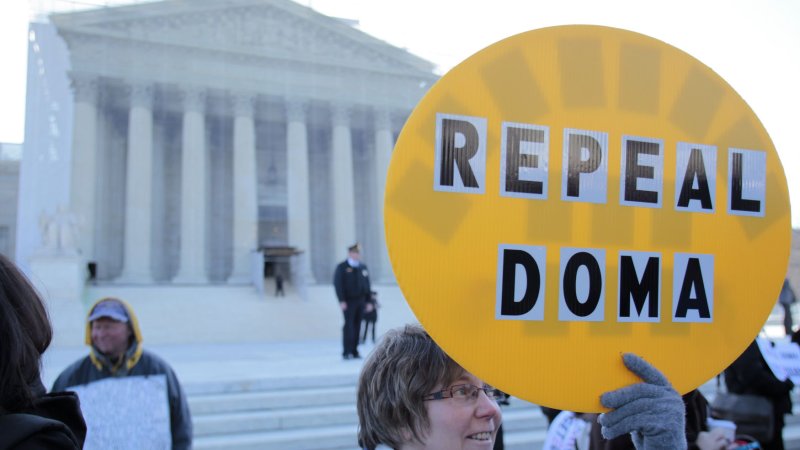1 of 6 | Same-sex marriage supporters rally in front of the U.S. Supreme Court as the Court hears arguments on same-sex marriage, on March 27, 2013 in Washington. The high court heard arguments today on the constitutionality of the 1996 Defense of Marriage Act (DOMA). UPI/Yuri Gripas. |
License Photo
Gay marriage advocates saw two historic Supreme Court decisions Wednesday, expanded rights for same-sex couples across the country and returning the legal right for same-sex couples to marry in California.
The Supreme Court struck down the Defense of Marriage Act, the federal law defining marriage as between one man and one woman. They also ruled against California's Proposition 8, determining the case bringing an appeal to the highest court had no standing.
With the invalidation of DOMA, the court ruled the federal government can not discriminate between legally married same-sex couples and different-sex couples, meaning same-sex married couples will received equal protection under all federal laws.
And in California, the court determined the proponents of Proposition 8 did not have legal standing on which to appeal a Fifth Circuit Court decision striking down the law, which banned same-sex marriage in the state.
Justice Anthony Kennedy wrote the opinion in United States v. Windsor, in which a New York woman was forced to pay $300,000 in taxes after her wife died because federal laws did not recognize their marriage.
Kennedy wrote that the law was unconstitutional on the basis of depriving equal liberty under the Fifth Amendment.
"The power of the Constitution grants it also restrains," Kennedy writes. "And though Congress has great authority to design laws to fit its own conception of sound national policy, it cannot deny the liberty protected by the Due Process Clause of the Fifth Amendment."
"What has been explained to this point should be more than suffice to establish that the principal purpose and the necessary effect of this law are to demean those persons who are in a lawful same-sex marriage," he wrote. "This requires the Court to hold, as it now does, that DOMA is unconstitutional as a deprivation of the liberty of the person protected by the Fifth Amendment of the Constitution."
"DOMA singles out a class of persons deemed by a State entitled to recognition and protection to enhance their own liberty," Kennedy wrote.
Chief Justice John Roberts and Justice Samuel Alito, and Justice Antonin Scalia each wrote dissents, with Justice Clarence Thomas, and Roberts in part, joining with Scalia.
In Hollingsworth v. Perry, the case deciding Proposition 8, Roberts wrote the opinion, joined by Scalia, Justices Ruth Bader Ginsberg, Stephen Breyer, and Justice Elena Kagan.
"We have never before upheld the standing of a private party to defend the constitutionality of a state statute when state officials have chosen not to. We decline to do so for the first time here," Roberts wrote.
Kennedy wrote the dissent, joined by Thomas, Alito and Justice Sonia Sotomayor.
Unlike the ruling on DOMA, the opinion on Proposition 8 did not deal directly with the issue of the constitutionality of gay marriage. It simply ruled that the proponents of California's ban, who stepped in to appeal a Ninth Circuit Court ruling striking down the ban on gay marriage, did not have a legal right to defend the law in court.
It's unclear exactly when same-sex marriages will resume in California, but the court's decision paves the way for those marriages to begin again soon.
President Obama, speaking from Air Force One on the way to being a trip through Africa, called the plaintiffs in the Prop 8 case, congratulating them personally.
The White House released a statement celebrating the Supreme Court's decisions.
I applaud the Supreme Court’s decision to strike down the Defense of Marriage Act. This was discrimination enshrined in law. It treated loving, committed gay and lesbian couples as a separate and lesser class of people. The Supreme Court has righted that wrong, and our country is better off for it. We are a people who declared that we are all created equal – and the love we commit to one another must be equal as well.
This ruling is a victory for couples who have long fought for equal treatment under the law; for children whose parents’ marriages will now be recognized, rightly, as legitimate; for families that, at long last, will get the respect and protection they deserve; and for friends and supporters who have wanted nothing more than to see their loved ones treated fairly and have worked hard to persuade their nation to change for the better.
So we welcome today’s decision, and I’ve directed the Attorney General to work with other members of my Cabinet to review all relevant federal statutes to ensure this decision, including its implications for Federal benefits and obligations, is implemented swiftly and smoothly.
On an issue as sensitive as this, knowing that Americans hold a wide range of views based on deeply held beliefs, maintaining our nation’s commitment to religious freedom is also vital. How religious institutions define and consecrate marriage has always been up to those institutions. Nothing about this decision – which applies only to civil marriages – changes that.
The laws of our land are catching up to the fundamental truth that millions of Americans hold in our hearts: when all Americans are treated as equal, no matter who they are or whom they love, we are all more free.
The full United States v. Windsor decision follows:
United States v. Windsor
The full Hollingsworth v. Perry decision:
Hollingsworth v. Perry















